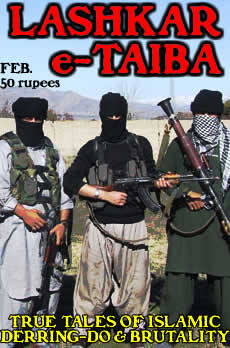[Dawn] The government banned on Saturday another three religious/charity organizations working in the country.
According to a bigwig of the interior ministry, with the latest ban imposed on Ahle Sunnat Wal Jamaat (ASWJ), Al Harmain Foundation (AHF) and Rabita Trust (RT),
I believe al-Harumain and Rabita Trust were banned under Perv in 2002 or thereabouts and removed after their protestations of innocence around 2006. The dates are just off the top of my head, so could be wrong.
the number of outlawed organizations and groups has risen to 38. The three organizations were outlawed by the United Nations
...boodling on the grand scale...
in 2009 under a resolution adopted by the Security Council.
... and three years later Pakistain gets around to putting them on the list of banned organizations, a process that still has nothing to do with putting them out of business...
The ASWJ, known previously as the Sipah-e-Sahaba Pakistain
...a Sunni Deobandi organization, a formerly registered Pak political party, established in the early 1980s in Jhang by Maulana Haq Nawaz Jhangvi. Its stated goal is to oppose Shia influence in Pakistain. They're not too big on Brelvis, either. Or Christians. Or anybody else who's not them. The organization was banned in 2002 as a terrorist organization, but somehow it keeps ticking along, piling up the corpse counts...
(SSP), is taking part in activities of a recently-formed group of religious organizations, Difa-e-Pakistain Council.
...and no suggestion of "banning" the Difa-e-Pakistain Council...
The council recently attracted large crowds at some of its public meetings in different cities where it lambasted both Islamabad and Washington.
The council may strongly react to the government's decision to ban one of its important members.
... probably by blowing something up or killing somebody or both...
The AHF is a Soddy Arabia-based organization and also working in Pakistain.
The official said the interior ministry had sent letters to the four provincial home secretaries, informing them about the ban on the three organizations. According to the BBC, ASWJ chief Maulana Ahmed Ludhyanvi expressed ignorance about any such ban.
"No, no! Certainly not!"
However,
Caliphornia hasn't yet slid into the ocean, no matter how hard it's tried...
he said if it was true he would opt for a legal fight. "We are a peaceful organization," he was quoted as saying. "If anyone places a ban on us...they are trying to place a ban on Pakistain."
A document, which the BBC describes as a notification issued by the interior ministry that was not publicly announced, claimed that the ASWJ was suspected to be involved in acts of terrorism in the country and, therefore, it was being added to the first schedule of the Anti-Terrorism Act, 1997.
The organizations previously banned by the government are: Lashkar-e-Jhangvi
... a 'more violent' offshoot of Sipah-e-Sahaba Pakistain. LeJ's purpose in life is to murder anyone who's not of utmost religious purity, starting with Shiites but including Brelvis, Ahmadis, Christians, Jews, Buddhists, Rosicrucians, and just about anyone else you can think of. They are currently a wholly-owned subsidiary of al-Qaeda ...
, Sipah-e-Muhammad Pakistain (banned on Aug 14, 2001), Jaish-e-Muhammad, Lashkar-e-Taiba
...the Army of the Pure, an Ahl-e-Hadith terror organization founded by Hafiz Saeed. LeT masquerades behind the Jamaat-ud-Dawa facade within Pakistain and periodically blows things up and kills people in India. Despite the fact that it is banned , always an interesting concept in Pakistain, the organization remains an blatant tool and perhaps an arm of the ISI...
, Sipah-e-Sahaba Pakistain, Tehrik-e-Jaafria Pakistain, Tehrik-e-Nifaz-e-Shariat-e-Muhammadi, Tehrik-e-Islami (on Jan 14, 2002), Al Qaeda (on March 17, 2003), Millat-e-Islamia Pakistain, Khuddam-ul-Islam, Islami Tehrik Pakistain (on Nov 15, 2003), Jamaat-ul-Ansar, Jamaat-ul-Furqan, Hizbut Tehrir (on Nov 20, 2003), Khair-un-Naas International Trust (on Oct 27, 2004), Balochistan
...the Pak province bordering Kandahar and Uruzgun provinces in Afghanistan and Sistan Baluchistan in Iran. Its native Baloch propulation is being displaced by Pashtuns and Punjabis and they aren't happy about it...
Liberation Army (on April 7, 2006), Islamic Students Movement of Pakistain (on Aug 21, 2006), Lashkar-e-Islam, Ansar-ul-Islam, Haji Namdar Group (on June 30, 2008), Tehrik-e-Taliban Pakistain (on Aug 25, 2008), Jamatud Daawa, Al-Akhtar Trust and Al-Rashid Trust (banned under the UNSC resolution 1267 on Dec 10, 2008), Shia Talba Action Committee, Markaz-e-Sabeel (Gilgit), Tanzeem Naujawan-e-Sunnat (Gilgit), People's Aman Committee, Balochistan Republican Army, Balochistan Liberation Front, Lashkar-e-Balochistan, Balochistan Liberation United Front and Balochistan Musallah Difa Tanzeem (banned in 2011).
The fact that there are this many extremist organizations -- merely the ones that urgently need banning, not all of them -- is simply breath-taking. And for some reason the Paks see the problem as some sort of "hidden hand." |


 [Dawn] THERE is substantive evidence to suggest that
[Dawn] THERE is substantive evidence to suggest that 
 Police shut down offices of Jamaatud Dawa and arrested scores of operatives as it continued a crackdown against the banned group on Friday, officials said.
Police shut down offices of Jamaatud Dawa and arrested scores of operatives as it continued a crackdown against the banned group on Friday, officials said. The Bush administration on Wednesday accused two blacklisted Pakistan-based groups, operating under new aliases, of trying to evade financial sanctions.
The Bush administration on Wednesday accused two blacklisted Pakistan-based groups, operating under new aliases, of trying to evade financial sanctions. The Habib Bank Limited froze the accounts of
The Habib Bank Limited froze the accounts of